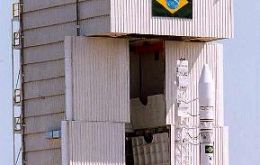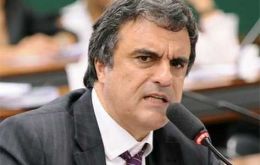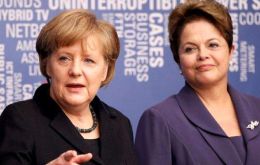MercoPress. South Atlantic News Agency
Brazil
-
Wednesday, November 6th 2013 - 09:06 UTC
Brazil's worst rocket launch tragedy had French spies as 'potential culprits'

Brazil’s intelligence agency monitored French spies it suspected of involvement in the 2003 explosion at a satellite launch base, the Folha de Sao Paulo newspaper said Tuesday, and though it was finally determined they played no role.
-
Wednesday, November 6th 2013 - 03:26 UTC
Brazil marks distance from US spying: 'we did not violate anyone's privacy rights'

Brazil's Minster of Justice Jose Eduardo Cardozo said on Tuesday that the spying performed by his country's intelligence agency did not violate anyone's privacy rights - unlike the spying committed by the United States.
-
Tuesday, November 5th 2013 - 13:50 UTC
Brazil consumer watchdog orders airlines to reduce 'abusive' domestic fare for 2014 World Cup

Brazil's consumer watchdog Procon Rio do Janeiro branch has ordered five airlines to reduce “abusive” domestic fares during next year's FIFA World Cup. Avianca, TAM, Gol, Azul and Oceanair have been accused of inflating prices up to 10-fold during the June 12-July 13 tournament.
-
Tuesday, November 5th 2013 - 08:06 UTC
Brazilian stats confirm the country is one of the most violent countries

Five people were killed on average daily in clashes with police in Brazil last year, according to a survey cited by the daily O Globo Sunday edition. The report from the Brazilian Forum on Public Security found that 1,890 people in 23 Brazilian states were killed in such circumstances in 2012, including 1,322 just in the states of Sao Paulo, Rio de Janeiro and Bahia.
-
Tuesday, November 5th 2013 - 08:02 UTC
Brazil admits to its own spying 'ten years ago and to protect the national interest'

Brazil which hotly denounced US surveillance of its leaders, itself spied on US officials as well as on Russia, Iran and Iraq a decade ago, the Folha de Sao Paulo newspaper reported on Monday.
-
Tuesday, November 5th 2013 - 07:26 UTC
South America's major military air exercise takes off in the north of Brazil

An international military exercise, organized by the Brazilian Air Force (FAB) and considered the largest in South America, began Monday at the country's two northeastern air bases, with the participation of air forces from Canada, Chile, Colombia, Ecuador, United States, Uruguay and Venezuela. Argentina dropped out at last moment.
-
Monday, November 4th 2013 - 23:57 UTC
EU lawmaker 'cautiously optimistic' about trade agreement with Mercosur in 2014

A member from the European parliament, Jean Pierre Audy who headed a mission to Brazil last week said he was confident that next year the long standing negotiations for a free trade and cooperation agreement between the European Union and Mercosur “could be concluded”.
-
Sunday, November 3rd 2013 - 03:14 UTC
Germany/Brazil initiative at the UN to end excessive electronic surveillance

Germany and Brazil circulated a draft resolution to a U.N. General Assembly committee on Friday that calls for an end to excessive electronic surveillance, data collection and other gross invasions of privacy. The draft resolution does not name any specific countries, although U.N. diplomats said it was clearly aimed at the United States, which has been embarrassed by revelations of a massive international surveillance program from a former US contractor.
-
Sunday, November 3rd 2013 - 00:42 UTC
Brazil posted in September its highest primary budget deficit in five years

Brazil posted a primary budget deficit of 9.048 billion Reais (4.1 billion dollars) in September, its biggest in nearly five years and the government reacted announcing a plan of cuts fearing an impact from credit rating agencies.
-
Sunday, November 3rd 2013 - 00:03 UTC
Brazil's golden boy files for bankruptcy; an example of overblown expectations?

Just a few year ago, flashy Brazilian billionaire Eike Batista was bragging that he would soon overpass Carlos Slim as the world's richest man. He even liked to show visitors his Mercedes-Benz McLaren parked right in the living room of his mansion. But his fall has been deep and fast.
